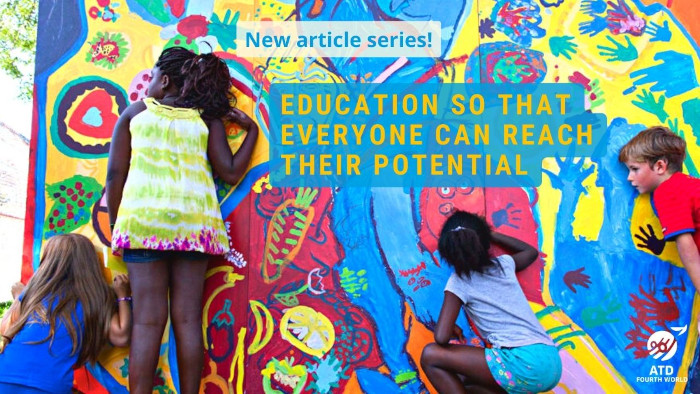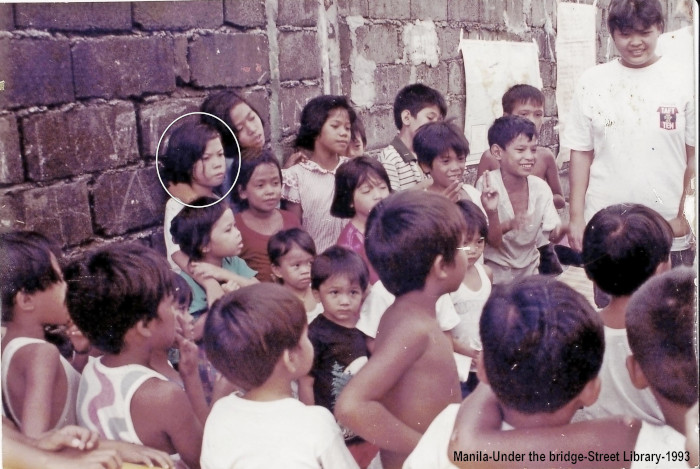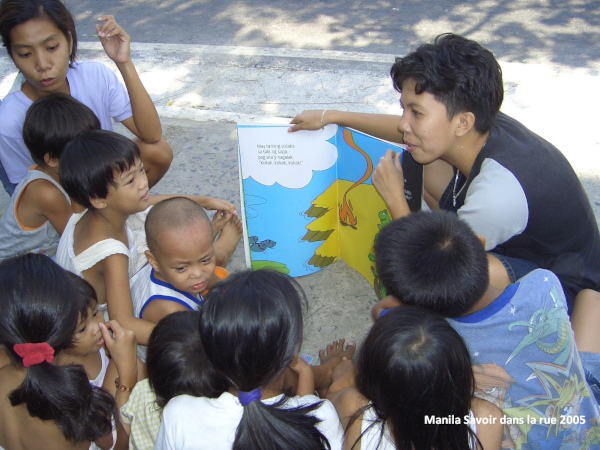Fulfilling Our Aspirations

ATD Fourth World’s goal is to create educational projects that originate from the aspirations of children with a lived experience of extreme poverty.
Inspired by their thirst for learning, ATD Fourth World supports children in extreme poverty and their families by creating projects that leave no one behind. In countries around the world, this has propelled ATD to prioritize quality education for all. Not only is this important on the grassroots level but in our international advocacy programs as well.
Learning from the successes in the field of education
Sarah Ortega, an ATD Fourth World Volunteer Corps member from the Philippines and other ATD members in Manila ran educational programs and activities that took place over a long period. After several years, Sarah was sent to work with ATD in France. When she returned to the Philippines after eight years in France, the first person she met was Cathy, a woman living in poverty who, as a child, took part in the street library. Below Sarah recounts1 how this encounter with Cathy motivated her and the ATD team in the Philippines to examine their street library program and ultimately restructure it.

-
“People with books”
- You were ten years old when I first met you. You lived under a bridge with your family. Under the bridge, a place you called home.
- I can still hear the echo of your voice when you said, “Your stuff with books sucks!” You always preferred to distance yourself from the other children and us. You were like a sentry watching over me with intense, critical eyes. You were very proud as a child, as proud as your parents, and you used to tell me, “My parents would never make me beg on the street.”
- It took us a long time to get to know you; you were close yet distant until one day, we became friends. We read many books together, and you remembered almost all the stories by heart. We did many different activities with the other children; we had a lot of fun. You shared your thoughts and feelings; sometimes, we discussed your dreams. You dreamed of being a teacher and having a house for your family. You wanted to be somebody; you wished to be like the people you call “people with books”.
-
“We want all children to have the same chances”
- You were with us every time there was a celebration or a gathering. I still have your image in my mind–14 years ago, during the inauguration of a stone in honor of those living in poverty. You and your friends were well-dressed like everyone else and stood in front of the crowd; even the Filipino president was in attendance. You were all holding a banner written with the names of children from all over the world; it said, “We want all children to have the same chances.” We wanted to get across the idea that all children should have a chance to get a good education, a chance to go to school. A chance to have a nice house and a chance to live in a real home, not under a bridge.
- Then, one day, I had to say goodbye to you; I left for a foreign country to meet other people, other children like you.
- You continued to grow up despite the difficulties of life. Life became so challenging for you and your family that you could not continue to go to school. Even during those years when life was so hard for you, you continued to believe and trust the people you called “people with books.” You continued to welcome the new volunteers. They became your friends too, and like me, they left you to go somewhere else after a while.
-
“We are as poor as when we were children.”
- After spending eight years in France, I returned to Manila, and we met again. The first comment you made to me was, “Look at us today; we are as poor as when we were children, and we still live under the bridge. No one has become rich or successful; on the contrary, some of us are in prison.” I felt your message like a slap in the face. I was shattered. I felt guilty.
- What will I do now? What do they want from me?
- I am faced with the reality of what you have now become.
- Do I have to start from the beginning to get to know you again, like I did when you were a child?
- You have been “bringing books to children” for four years now. One day, you asked me to accompany you under the bridge. In front of the children, I see the way you welcome them. When you tell them stories, I see how the children look at you with wonder. I look at you with great respect and appreciation. There you are, standing among the children, full of life and energy.
- You are still as proud as you were when you were a child.
- You introduced me to the new children.
- They are the children of the children I knew when they were around the same age.
- They are the children of Niknoy, Tina, Mayette, Julius, Rowelson, Charlita, Jobeth Benjie, and many others…

Restructuring for progress
Sarah admires the person Cathy has become, but the phrase “Look, we’re still as poor as when we were children” still upsets her. Sarah and the ATD team in Manila took what Cathy said so seriously that they made it the starting point for rethinking the Street Library program in Manila2. This gradually led to a complete restructuring of the program and the creation of “Ang Galing!” among other initiatives.
This brings up the question, how can we develop programs together with families and communities to support children’s education so that these children do not live the same life of poverty as their parents?
How can we together, create programs to achieve real social and cultural advancement of children and break the vicious cycle of extreme poverty?
***
Prioritizing access to quality education
In 2013, similar questions emerged when ATD was working on its strategic ambitions regarding the persistence of generational poverty. Families in situations of extreme poverty spoke of the constant obstacles to their children’s education despite the progress of education accessibility in their respective countries. These included hidden school costs and the impossibility of school registration without a birth certificate, to name just a few. Some families remarked that if their children did have the chance to go to school, they always stopped too soon and lacked basic skills. Families deplored the lack of quality education provided to children living in poverty. They also condemned curricula that did not meet their needs or employment opportunities in their communities. Children in extreme poverty said their learning opportunities were stifled by stigma and suffering in schools that cultivated a culture of competition.
That same year, ATD Fourth World decided to prioritize access to quality education for all, both in its programs and advocacy. ATD mobilized to support the efforts of teams working with children or experimenting with projects in the field of education.
From 2015 to 2018, through a series of seminars, ATD teams from different countries were able to learn from each other’s successes. They were thus able to inspire each other and future programs.
COVID-19
Since then, the COVID-19 pandemic led to the closure of schools for many months and in several countries for one or two years. Many were deprived of learning the practical skills needed to enter the workforce. The disappearance of the structure and cultural grounding that schools provide meant that the future for many was undermined.
Today, ATD Fourth World teams seek to reach children left behind. Some are even more withdrawn and have more difficulty achieving than before. Certain ATD teams are resuming programs, and others are working to build new ones based on the impact of successive crises related to COVID-19, climate change or political instability. All these teams seek, with parents and their communities, strategies to repair the damage to child development.
A series of success stories offering hope and creativity
For ATD teams and educators (parents, teachers, facilitators, community activists, social workers, etc.) involved in the fight against extreme poverty and its harmful effects on children, ATD is collecting and will make available some of our work in the field of education. We will publish a series of success stories carried out by our teams with children, parents, and their communities.
This series aims to inspire the hope and creativity of those working with children by sharing our experiences. We are optimistic that these success stories will contribute to broadening the ideas, programs and possibilities when working with children in extreme poverty so that they can reach their full potential. We hope that teaching methods to overcome the persistence of generational poverty will emerge.
This series includes accounts from several countries: how children living in a Manila cemetery regained an interest in school thanks to programs started by ATD Fourth World members in their community, a rural community in Brazil that worked to open a public school providing quality education and, a mother in Tanzania fighting for the education of her daughters.
What does it take so that all children can learn? Members of ATD Fourth World answer this question below.


Play with YouTube
By clicking on the video you accept that YouTube drop its cookies on your browser.
The first part of our series will be dedicated to programs that support parents and family ties.

